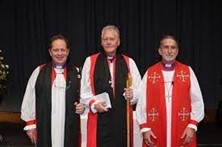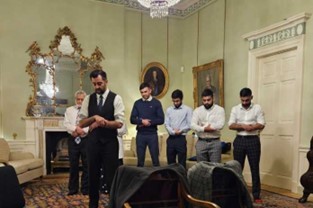Gafcon GB&E region:
Anglicans in Wales
Since the decision by the Governing Body of the Church in September 2021 in Wales to permit blessing of same sex relationships, some new Anglican congregations have been formed under the jurisdiction of Anglican Convocation Europe (ACE). On 17th March Stuart Bell was consecrated as Bishop by Archbishop Foley Beach of Gafcon and other bishops (report here), to serve under Bishop Andy Lines with special responsibility for emerging ACE congregations and their ministers in Wales.
The consecration provoked a response from the Bishops of the Church in Wales. A statement from Bishop Andy Lines of ANiE addresses their concerns and clarifies the situation.
CEEC
The Church of England Evangelical Council is not officially linked to Gafcon, although its members and associated congregations share the same commitment to a biblical understanding of salvation, and of the doctrines of humanity, sex and marriage. CEEC have invited members to sign a statement pledging to resist proposed changes to doctrine and liturgy. CEEC suggests the creation of formal structures within the Church of England, to separate orthodox Anglicans from revisionist leadership. The Chairman of Gafcon GBE was granted observer status at the recent residential conference of the Council, and a number of senior CEEC figures will attend Gafcon IV in Kigali. Pray that this would lead to greater unity (see above).
Other relationships
The Free Church of England, also aligned to the Gafcon vision and part of Gafcon GBE, will be represented in Kigali by Revd (Deacon) Calvin Robinson.
A new relationship is being explored between Gafcon GBE, the Anglican Church of Nigeria, and another church planting movement, the Anglican Missionary Congregations Europe. They will also have representatives at Kigali. Bishop Andy Lines is speaking at a conference they are holding this week.
More high profile resistance to the Church of England leadership
William Taylor, Rector of St Helen’s Bishopsgate, has not only declared a state of impaired communion with his Diocesan Bishop, but insisted on “structural differentiation” – a future in which St Helens and aligned congregations must have orthodox episcopal oversight, preferably within the Church of England, but if not, in a different Anglican jurisdiction. See here for a video of his announcement, with a transcript.
It is not immediately apparent how Gafcon and/or GSFA leadership, themselves in impaired communion with Canterbury, could provide alternative episcopal oversight to congregations which remain in the Church of England. Pray for fruitful conversations on this issue at Gafcon IV, without it dominating proceedings.
See also:
Church of England Ordinands plea for alternative Episcopal oversight. Open letter to Bishops, published on Anglican Ink.
Scotland and the task facing the church.
David Robertson comments on the election of Humza Yousaf as leader of the SNP and First Minister of Scotland. Robertson says that Yousaf has a Muslim identity [See the photo below, of him leading prayers in the official residence] but “his real religion is progressivism”, and lists the anti-Christian policies he has supported while in charge of other departments.

The election of Yousaf is a symptom both of the secularisation of Western society and the increasing influence of Islam. Robertson says the answer is not necessarily to vote in a Christian leader, but rather to win people for Christ. Pray for those churches committed to doing this in Scotland, especially those in the Anglican Convocation Europe.
Spain: Canterbury-aligned Anglicans equivocate over same sex blessings. From Evangelical Focus.
Key issues in society
Sex education in schools: essential ‘value-free’ information, or ideological indoctrination?
Identity politics and sex education in schools. Article from Transgender Trend:
The Prime Minister, Rishi Sunak, has announced that a review of government Relationships and Sex Education (RSE) guidance will be brought forward following a disturbing report on external RSE resources, commissioned by Miriam Cates MP. But a review of RSE guidance does not go far enough without looking at the root cause of how extreme, age-inappropriate sex resources have been accepted into schools in the first place.
See also:
‘Education not indoctrination’ isn’t just a slogan, it’s written into law. From the Christian Institute
Easter reflection - Who is our King?
On Palm Sunday, Jesus rode into Jerusalem as a conquering king. Crowds lined the streets, and John’s account (12:12-16) specifically tells us that they shouted “blessed is the king of Israel!” But he was riding on a donkey, fulfilling the prophecy from Zechariah, demonstrating the godly, humble leadership of the servant King.
The acclamation as King by the crowds is preceded by a symbolic anointing. Psalm 45:7-8 says:
Your throne, O God, will last for ever and ever;
a sceptre of justice will be the sceptre of your kingdom.
You love righteousness and hate wickedness;
therefore God, your God, has set you above your companions
by anointing you with the oil of joy.
All your robes are fragrant with myrrh and aloes and cassia…
Perhaps Jesus’ robes were still fragrant with the pure nard which Mary had poured on him at the dinner the night before – costly sweet smelling oil which marked Jesus as King, and also pointed towards and prepared him for burial (John 12:7).
As the narrative of the Passion reaches its dreadful conclusion with the trial before Pilate, the gospel writer John returns to the theme of kingship (18:33-19:22). “Are you the king of the Jews?” the Roman governor asks Jesus. “My kingdom is not of this world”, he replies, as he explains his mission.
Pilate does not understand, but worse is the attitude of the crowd and the religious leaders. They demand the release of Barabbas instead of the innocent one. The Roman soldiers dress Jesus up in a grotesque and agonising parody of kingship, the crown of thorns and the purple robe. Again Pilate gave the crowd an opportunity to release Jesus, but they demanded his crucifixion. The religious leaders, in response to the question “shall I crucify your king?”, replied “we have no king but Caesar”. Jesus was crucified with a sign above his head reading “the king of the Jews”. In the minds of the Romans, this is a warning against political rebellion. But in fact, to the believer with the perspective of the big picture, it’s a statement of truth – he really is the King, and not only of one group of people.
If Jesus is not the anointed King of the universe, then this story is one of tragic delusion and brutal cruelty, which is ultimately meaningless. But if he is the King, then to treat him this way is surely treason which deserves the harshest punishment on all who participate. I’m not exempt – as the Stuart Townend song says ”I hear my mocking voice call out among the scoffers”. Amazingly, the deserved punishment instead falls on the Lamb of God who takes away the sin of the world.
But we should not forget the warning in these verses. Religious leaders, who profess to know God and his word, and nominally accept his supreme authority, reject God’s anointed King, and instead profess allegiance to the powers of this world - “we have no king but Caesar”. The same can happen today, and when it does, we should ensure that we stand with those who acknowledge Jesus as King, even if it means following him into humiliation. Because only then will resurrection and glory follow
Easter resources
7 classic books on the Cross
The Cross He Bore by Frederick Leahy.
The Truth of the Cross by R.C. Sproul
The Cross of Christ by John Stott
Blood Work by Anthony Carter
In My Place Condemned He Stood : Essays by JI Packer, Edited by Mark Dever
Scandalous , by Don Carson
Fifty Reasons why Jesus came to die, by John Piper
7 of the best books on the Resurrection, by Mike Licona
10 Resources to Teach Kids About the Resurrection By Jared Kennedy, The Gospel Coalition